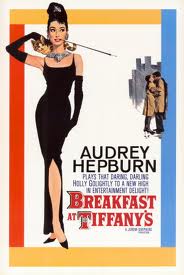
- HFPA
Breakfast at Tiffany’s

By JORGE CAMARA.
More than Roman Holiday, Sabrina, My Fair Lady or any of her many other films, the signature image of Audrey Hepburn for which she is most remembered – the long elegant black dress, the stylish hair-do, the string of pearls, and of course the impossibly long cigarette holder – belongs to Breakfast at Tiffany’s. With her performance in that movie and her wardrobe designed by her friend, Givenchy, Hepburn cemented her reputation as a fashion icon and Hollywood's reigning queen of chic, never mind that her part was really that of prostitute.
Breakfast at Tiffany’s was adapted from a novella by Truman Capote, who was not pleased with the dramatic changes that Paramount Studios and screenwriter George Axelrod made to his work. For one thing Capote’s story was somewhat dark and gritty and not “a valentine to New York,” as he later complained. For another, the author wanted Marilyn Monroe for the part of Holly Golightly, a free-spirited party girl of dubious origins who wants to marry the richest man in world, but whose only companion is a nameless cat. It was not to be, despite the writer's pleas, since Monroe was under contract to 20th Century Fox, and Hepburn was Paramount’s brightest new star.
The starring cast was completed by George Peppard as Paul Varjak, a struggling writer who falls in love with Holly, but who is “helped” by a rich “patron” played by Patricia Neal. One of the best elements of the picture is “Moon River”, the song with words by Johnny Mercer and music by Henry Mancini, that Hepburn sings with a guitar sitting on the outside stairs of her apartment after she’s washed her hair. Ironically, it is reported that when the movie was previewed, Martin Rackin, head of Paramount production, said, “that f*ing song has to go,” while Hepburn had to be restrained by her then husband, Mel Ferrer, screaming back, “over my dead body.”
Perhaps the most controversial aspect of the film is Mickey Rooney’s stereotypical portrayal, with buck teeth and a phony accent, of Mr. Yunioshi, the Japanese landlord. Political correctness was not in vogue then, but why Hepburn didn’t say anything is not known; four years before, she was offered the part of a Japanese bride in Sayonara with Marlon Brando, which she refused saying, “I couldn’t possibly play an Oriental. No one would believe me. They’d laugh. And if you did persuade me, you would regret it, because I’d be terrible.”
In 1962, Breakfast at Tiffany’s won two Golden Globe nominations, as a Best Motion Picture – Comedy and for Audrey Hepburn as a Best Motion Picture Actress – Musical or Comedy.

